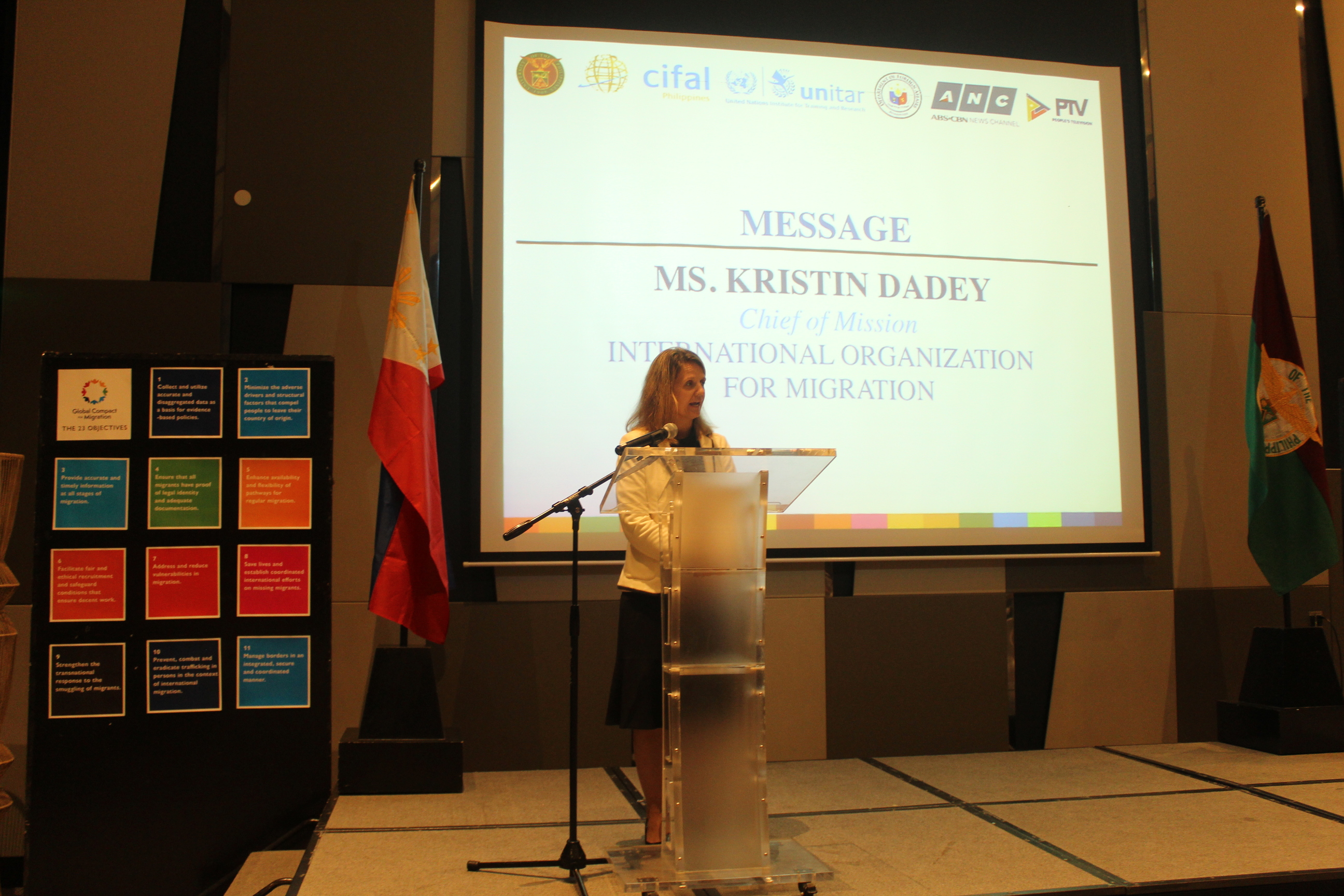MESSAGE
Kristin Dadey, Chief of Mission of the International Organization for Migration
CIFAL High Level Forum on Global Migration
Quezon 3 Ballroom, Seda Vertis North, Quezon City | 2 December 2019
- IOM warmly welcomes the One Year Anniversary of the Global Compact for Safe, Orderly and Regular Migration. And, I fully commend, the Government of the Philippines, particularly his excellency, Secretary Teodoro Locsin, for his leadership and commitment to the implementation of the GCM or as he calls it, the “Compact of Compassion.”
- The Global Compact is a truly historic and remarkable achievement – historic because it is the first comprehensive agreement on migration developed through inter-governmental negotiations in the United Nations, and remarkable that this was achieved at a time when the narrative around migration is so politically charged.
- To be clear, The GCM is an initiative of Member States, driven by their need to enhance collaboration on international migration in all its dimensions, to address its opportunities and challenges for individuals and communities in countries of origin, transit and destination and reap its benefits. IOM sincerely congratulates the Government of the Philippines, and particularly DFA, for their instrumental efforts in negotiating the Compact and ensuring a rights-based approach to migration.
- The GCM also recognizes that no State can address migration alone, that national migration policies are more likely to succeed through international cooperation with a whole-of-society and a whole-of-government approach and when grounded on respect for human rights and the rule of law. That is the message of the GCM.
- The GCM is the culmination of over 18 months of intensive, open consultations and negotiations, with governments, the UN system, local authorities, civil society, business and the private sector, trade unions and workers organizations, among other relevant stakeholders.
- The GCM’s essential strength is that it is a cooperative, non-binding document, grounded in international law. It is a reaffirmation of collective and mutually inclusive commitments – to national sovereignty and to universal human rights – in the pursuit of an approach to international migration that benefits all.
- The GCM is a re-affirmation of the values and principles embodied in the UN Charter and in international law, providing an important breakthrough in our collective efforts to address the challenges and opportunities of human mobility, grounded in values of responsibility sharing, state sovereignty, non-discrimination and human rights.
- The GCM is inextricably linked with all seventeen Sustainable Development Goals of the 2030 Agenda for Sustainable Development – to truly leave no one behind including migrants. For the first time ever, migration is mentioned in the SDG. Target 10.7 calls upon States to “Facilitate Safe, Orderly and Regular Migration.”
- The UN system’s support to implementation of the Global Compact will be provided by a new UN Network on Migration. IOM is honoured to have been given, by the UN Secretary General, as also confirmed/endorsed by states in the GCM, the task of coordinating the Network and serving as its secretariat.
- At the very least, in relevant UN resolutions, encourage maintaining some reference to the GCM and its guiding principles, including being “people-centred; international cooperation; national sovereignty; rule of law and due process; sustainable development; human rights; gender-responsive; child-sensitive; whole-of-government approach; whole-of-society approach.”
- IOM stands by to support the Philippines as they are champions of the GCM. IOM also stand by reading to support a collective commitment to improving cooperation on international migration and the overarching obligation to respect, protect and fulfill the human rights of all migrants while promoting the security and prosperity of all our communities.

![[RIGHT]unitar_logo](https://cifal.up.edu.ph/wp-content/uploads/2024/01/RIGHTunitar_logo.png)
